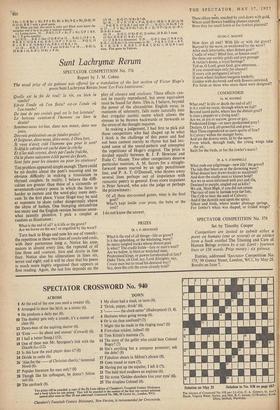Sunt Lachrymcv Rerum
SPECTATOR COMPETITION No. 376 Report by J. M. Cohen
The usual prize of six guineas was offered for a translation of the last section of Victor Hugo's poem Sunt Lachrymm Rerum froni 'Les Voix Interieures.'
Queue est la tornbe? Est-ce l'onde l'on tornbe? De tant de pas croises quel est le but lointain? Le berceau contient-il l'homme on bien le destin?
Sommes-nous ici-bas, dans nos maux, dans nos joies, Des rois predestines on de fatales proles?
0 Seigneur, dites-nous, dites-nous, 6 Dieu fort, Si vous n'avez cree l'homme que pour le sort? Si déjà le calvaire est cache dans la creche Et sites nids soyeux, clods par l'aube fraiche, Oa la plume naissante eclot parmi des fleurs, Sont faits pour les oiseaux on pour les oiseleurs?
THE problem appeared simple enough. There could be no doubts about the poet's meaning and no obvious difficulty in making a translation in rhymed couplets. In reality, I believe the diffi- culties are greater than those of a sixteenth- or seventeenth-century poem in which the form is harder to imitate and the word-play more intri- cate. In the first place, Victor Hugo may be said at moments to skate rather dangerously above the abyss of bathos. One bumping alexandrine too many and the English version becomes some- what jauntily plaintive. I pick a couplet at random as illustration : What is the end of all? is it life or the grave?
Are we borne on the sea? or engulfed by the wave?
Turn back to Hugo and note his use of vowels : the repetition in these two lines of tombe and sonde, with their portentous long o. Notice his asso- nances in almost every line, the repeated oi of line three and contient, bien and destin in line four. Notice also his alliterations in lines six, seven and eight; and it will be clear that his poem is much more highly organised than appears at first reading. Again, the last line depends on the fin de tout? la vie, ou bien la oa l'on flotte? est-ce l'onde oa play of oiseaux and oiseleurs. These effects can- not be exactly reproduced, but some equivalent must be found for them. This is, I believe, beyond the power of the alexandrine. English verse, in moments of solemnity, falls more naturally into that irregular iambic metre which allows the stresses to be thrown backwards or forwards as the stress of the thought requires.
In making a judgement, I had first to pick out those competitors who had shaped up to what I think is the challenge of this poem and had not been content merely to rhyme but had imi- tated some of the sound-pattern and attempted the repetitions of Hugo's original. The prize is divided equally between R. J. P. Hewison- and Eudo C. Mason. Two other competitors deserve particular mention, A. M. Sayers for a straight- forward poem marred by an ugly penultimate line, and P. A. T. O'Donnell, who throws away several lines perhaps out of impatience with romantic poetry in general. Even more impatient is Peter Seward, who asks the judge or perhaps the prizewinners :
Of all these star-crossed games, what is the final goal?
What's kept inside your pram, the baby or the coal?
I do not know the answer.
PRIZES
(a. J. P. HEW1SON)
What is the end of all things—life or grave? Is it the upholding, or the whelming, wave? So many tangled tracks whose distant goal Is what? The cradle holds—fate or man's soul? Are we below, in blest or wretched state, Predestined kings, or pawns foredoomed of fate? Didst Thou, oh God, say, Lord Almighty, say, Create man but to tread his destined way? Say, does the crib the cross already hold? These silken nests, touched by cool dawn with gold, Where amid flowers budding plumes expand, Were they for small fowls or for fowlers planned?
(Euno C. MASON) How does all end? With life or with the grave?, Buoyed by the wave, or swallowed by the wave?
After such labyrinths, what distant goal?
Cradle of what? Blind fate, or human soul?
Do these our earthly griefs and joys presage A victim's doom, a royal heritage?
Tell us, 0 Lord, great God, give utterance, If you created man only for chance?
If every crib prefigures Calvary? If nests where feathers burgeon tenderly, Golden with daybreak and with flowers entwined, For birds or those who snare them were designed?
COMMENDED
(A. M. SAYERS)
What end? Is life or death the end of all?
Is it a void we roam, through which we fall?
Beyond laced paths, where lies the distant goal?
Is man a puppet or a living soul? Are we, in joy or sorrow, grave or gay, Predestined kings—or mere predestined prey? Declare, 0 Lord, all-powerful and great- Hast Thou engendered us mere sports of fate? Is Calvary within the manger born; And are the downy nests, lit by the morn, From which, through buds, the young wings take the air, Built for the birds, or for the fowler's snare?
(P. A. T. O'DONNELL)
What ends our pilgrimage—new life? the grave? The tide that bears us or the drowning wave?
What distant lure draws tracks so manifold?
And does the cradle man or kismet hold?
Are we so soon informed with joys and ills, Destined to purple, singled out as kills?
We ask, Most High, if you did not create The race of men to furnish toys for fate, The Crib to bear the seed of Calvary; And if the dawnlit nest upon the spray, Silken and fresh, where tender plumage springs, For fowler's whim was shaped, or folded wings?


































 Previous page
Previous page